SUCCESSES AND FAILURES OF SOCIO-EDUCATIONAL POLICIES ON THE COLOMBIAN-VENEZUELAN BORDER: THE BASIS FOR AN EDUCATIONAL MODEL FOR THE RURAL SECTOR
DOI:
https://doi.org/10.56219/lneaimaginaria.v2i20.3730Keywords:
Socio-educational policies, Colombian-Venezuelan border, educational model and rural sectorAbstract
Education is currently facing significant changes that respond to the demands of the social conglomerate that seeks to address a myriad of situations that arise and that is why it is worth addressing the socio-educational policies, currently respond to the interests of the Nation found in the Magna Carta of the Republic (Political Constitution of Colombia, 1991); which leads to a thorough review of what is wanted of the citizens that have emerged as a result of multiple studies, thus, it is proposed as a general objective: To reflect on the successes and failures of socio-educational policies in the Colombian-Venezuelan border: bases for an educational model for the rural sector. The methodology used focused on documentary analysis, generating a theoretical contribution that contributes to the foundations for the basis of an educational model for the rural sector. Bearing in mind that at present there have been changes and transformations according to the demands of society; since, at present the curricular designs are outdated, due to the dates of creation of the same with a date of more than a decade, which needs to be addressed to rethink about a new model that fits the demands of today, thus offering benefits to the educational actors in search of the quality of the educational processes.
Downloads
References
Aguilar, C. (2024). Integración al sistema educativo colombiano de los migrantes venezolanos durante el periodo 2018–2023. https://expeditiorepositorio.utadeo.edu.co/handle/20.500.12010/36059
Amnistía Internacional (2023). Annual Report. https://www.amnesty.org/es/documents/pol10/5670/2023/es/
Bayona, B. (2024). Resignificación del currículo en el marco de la cultura de paz de la educación media en el contexto fronterizo. http://espacio.digital.upel.edu.ve/index.php/TD/article/view/1548/1469
Buitrago, D. (26 de febrero de 2025). Crisis en la educación rural: mala infraestructura, falta de docentes y deserción son los principales factores. Cambio. https://cambiocolombia.com/educacion/crisis-educacion-rural-infraestructura-carencia-docentes-desercion-escolar
Cancillería. (2018). Estatuto Temporal de Protección para Migrantes Venezolanos en Colombia. https://www.cancilleria.gov.co/sites/default/files/FOTOS2020/ok._esp-_abc_estatuto_al_migrante_venezolano-_05mar-2021.pdf
Decreto 1288. (2018). Medidas para garantizar el acceso de las personas inscritas en el Registro Administrativo de Migrantes Venezolanos a la oferta institucional. https://www.funcionpublica.gov.co/eva/gestornormativo/norma.php?i=87780
Human Rights Watch. (2024). Aumentan a nivel global los ataques a la educación en contextos de guerra. https://www.hrw.org/es/news/2024/06/20/aumentan-nivel-global-los-ataques-la-educacion-en-contextos-de-guerra
López, E., & Vargas, E. (2023). La incorporación de estudiantes venezolanos al sistema educativo colombiano en Cúcuta (2015-2020). Estudios Fronterizos, vol. 24, 2023, e134. https://dialnet.unirioja.es/descarga/articulo/9205429.pdf
MEN (2020). La Opinión: Una educación inclusiva para los niños migrantes venezolanos. https://www.mineducacion.gov.co/portal/salaprensa/Especiales-Prensa/402487:La-Opinion-Una-educacion-inclusiva-para-los-ninos-migrantes-venezolanos
MEN (2022). Estrategias del sistema educativo colombiano para la atención de la población estudiantil en contextos de movilidad humana y migración: una mirada al caso migratorio venezolano. https://www.mineducacion.gov.co/1780/articles-363488_recurso_19.pdf
ODISEF (2023). Educando para la inclusión en la frontera. https://odisef.org/repositorio/publicaciones/productos/Kit%20de%20cartillas%20pedag%C3%B3gicas%20%E2%80%9CEducando%20para%20la%20inclusi%C3%B3n%20en%20la%20frontera%E2%80%9D.pdf
PROVEA. (2021). En Apure el derecho a la educación está en jaque. https://provea.org/actualidad/en-apure-el-derecho-a-la-educacion-esta-en-jaque/
R4V. (2022). ¿Qué es el Sector de Educación? https://www.r4v.info/es/educaci%C3%B3n
ReliefWeb. (2022). ESTRATEGIA 2022-2023. Versión agosto 2022. https://inee.org/sites/default/files/resources/Venezuela%20-%20Estrategia%20Clu%CC%81ster%20de%20Educacio%CC%81n%202022-2023%20(Versio%CC%81n%20Agosto%202022).pdf
Sherif, Y. (2024). Education Cannot Wait aumenta las inversiones en Colombia con una subvención de US$12 millones del Catalizador Programa de Resiliencia Multianual, el financiamiento total ahora supera los US$28 millones. Education Cannot Wait. https://www.educationcannotwait.org/es/news-stories/press-releases/education-cannot-wait-aumenta-las-inversiones-en-colombia-con-una-0#:~:text=El%20programa%20busca%20eliminar%20las,y%20la%20violencia%20en%20Colombia.
UNESCO (2022). Global Education Monitoring Report. https://www.unesco.org/gem-report/es
UNICEF (2021). State of the World’s Children Report 2021. https://www.unicef.org/reports/state-worlds-children-2021
Universidad de la Guajira. (2023). ¿Qué pasa con la calidad educativa en La Guajira? https://uniguajira.edu.co/que-pasa-con-la-calidad-educativa-en-la-guajira/
Downloads
Published
How to Cite
Issue
Section
License
Copyright (c) 2025 LÍNEA IMAGINARIA

This work is licensed under a Creative Commons Attribution-NonCommercial-ShareAlike 4.0 International License.
La revista Línea Imaginaria conserva los derechos patrimoniales (copyright) de las obras publicadas, que favorece y permite la reutilización de los mismos bajo la licencia Creative Commons Atribución-NoComercial-CompartirIgual 4.0 , por lo cual se pueden copiar, usar, difundir, transmitir y exponer públicamente, siempre que se cite la autoría y fuente original de su publicación (revista, editorial, URL y DOI de la obra), no se usen para fines comerciales u onerosos y se mencione la existencia y especificaciones de esta licencia de uso. Si remezcla, transforma o crea a partir del material, debe distribuir su contribución bajo la misma licencia del original.














